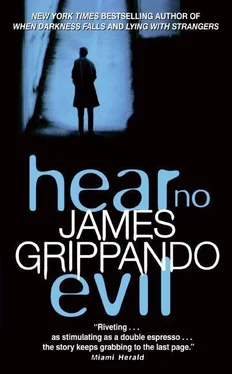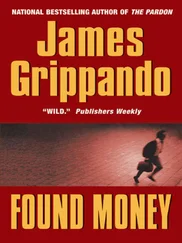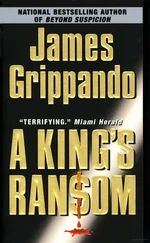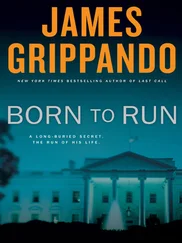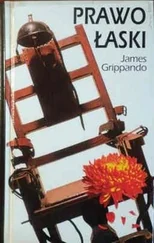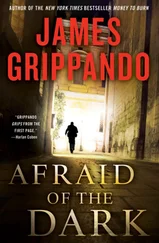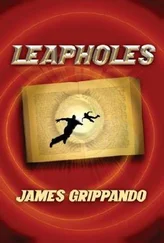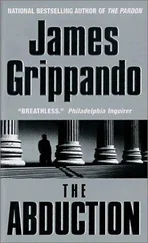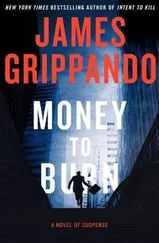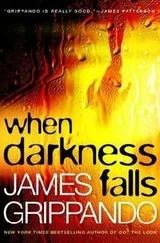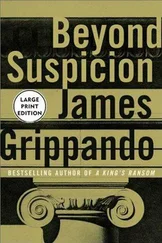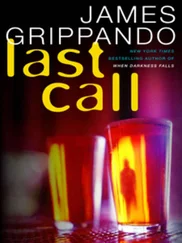“Forget about her, you say?” said Jack.
“Sí, sí. Forget her.”
Jack shook his head, his thoughts still with Lindsey’s son. His son. “It’s not that easy.”
They made it through the checkout line without too much financial damage, and Jack drove them to his house. Abuela had a fine kitchen, but nothing seemed to give her quite as much pleasure as taking over someone else’s. In minutes she had unpacked the groceries and set up various food-preparation stations around Jack’s kitchen counters and stove.
Jack went straight to the television and switched on Action News at Six. The feed-in for the lead story was basically the same report that Jack had watched in Spanish. As a bonus, however, the anchorwoman had somehow snagged an exclusive live interview with Alejandro Pintado from his mega-mansion in Journey’s End, one of south Florida ’s most exclusive communities.
“Mr. Pintado, we understand that your son and daughter-in-law had just one child, a ten-year-old son. What will become of him now that his mother has been indicted and denied bail?”
Pintado spoke in a solemn voice, his wife seated at his side on the couch. “The loss of our son is a terrible tragedy, but we are determined to avoid more harm to our family. Our grandson has decided that he wants to stay with us while his mother is in jail, and Lindsey’s attorney has indicated her agreement to that arrangement.”
“Will that become permanent if your daughter-in-law is convicted of murder?”
“We expect that it will, yes.”
The anchorwoman tried to get him to talk about the evidence against Lindsey, but Pintado wisely declined, probably at the behind-the-scenes direction of the prosecutor. She thanked him and brought the interview to a close.
Jack looked up from the set and saw his grandmother shooting him a reproving look. “What?” he said.
“You going to help, or you going to watch TV?”
“I’ll help.” He walked to the kitchen counter, gathered up the dirty mixing bowls, and started toward the sink. Another glare from Abuela stopped him cold.
“Who taught you to clean while you cook?” she said.
“Sorry,” said Jack. Obviously she and his buddy Theo were of the same school when it came to the joy of cooking.
“Go sit over there,” she said. “Watch and learn.”
Abuela was singing something in Spanish as she cooked, and watching and hearing her gave Jack an idea. He pulled down an atlas from the bookshelf and turned to a map of Cuba. Suddenly, Abuela was looking over his shoulder, as if she were equipped with homeland radar.
“Bejucal,” she said, pointing to a tiny black dot of a town near Havana. “Is where your mother grew up.”
Jack sat in silence. He’d heard the stories of how his mother had come to Miami after the Cuban revolution. Focused on that spot on the map, he could imagine his mother and grandmother hugging and kissing each other for the very last time. Abuela had made the heart-wrenching decision to send her teenage daughter to the United States without her, knowing that it was better for her to live in freedom, and hoping that they would soon find a way to reunite. Unfortunately, it wasn’t until long after her daughter’s passing that Abuela was finally able to make the trip.
Like any escape route, the one from Havana was fraught with personal tragedies, Abuela and Jack’s mother just one of thousands. In the broader annals of U.S. immigration history, however, the Cubans were an amazing success, particularly in Miami. There had been setbacks, of course, and any comparison of the first wave of immigration in the 1960s to some of the later refugees was bound to raise a few eyebrows, even among Cuban Americans. You could argue about that one till the vacas came home. The bottom line, however, was that both the city and county commissions were controlled by Cubans, the city mayor was Cuban, the county mayor was Cuban, three of South Florida’s five congressional representatives were Cuban, and many of the most successful banks, businesses, law firms, brokerage houses, and so on were headed by Cubans. Unlike most Latino groups, Cuban Americans were largely Republican, not Democrat, and not just because Democrats were perceived as too soft on Castro. It was because so many Cuban Americans-Alejandro Pintado among them-had accumulated more than enough honest wealth to be counted among the GOP’s biggest campaign contributors. Yet, with all those accomplishments, many still talked of someday going back to Cuba, if not to live, then at least to help rebuild the economy after Castro’s long-awaited fall.
Jack had never really gotten caught up in all that “back to Cuba ” talk. He hadn’t been raised Cuban, he spoke stilted Spanish, and he hadn’t really circulated in Latin social circles. Most people had no idea his mother was Cuban, so it wasn’t unusual for him to find himself privy to a gathering of Anglos plotting their imminent departure from the “third-world country” that Miami was becoming. If enough liquor was flowing, some pretty respectable people were more than willing to buddy-up with an apparent gringo named Swyteck and reveal their secret wish to look their Cuban neighbor in the eye and say, “Hey, José, if you want to go back to Cuba so damn bad, then do us all a favor and get back on your fucking banana boat and get the hell out of here.” Sometimes Jack would buck up and say something; sometimes he figured it wasn’t worth his effort. But deep down he knew that what really bugged the loudest complainers was that, if all these so-called “Josés” did go back to Cuba, they wouldn’t be traveling by banana boat. In fact, a good many of them would fly their children home from college at Harvard or Yale, hop on the eighty-foot yacht that was docked behind their three-million-dollar mansion in Gables Estates, and make a nice family trip out of it, soaking up sun and sipping cold mojitos served by one of their three Honduran housemaids.
“I should go to Bejucal,” said Jack.
“What?”
“If I get back into this case for my friend Lindsey, I’ll have to travel to Cuba. I should take a side trip to Bejucal.”
Abuela said nothing. Jack asked, “What was it like there when my mother left?”
Abuela took a deep breath, let it out. Then she answered in Spanish. “It was exactly the way it was when I left, thirty-eight years later.”
“Really?”
“Yes. And it was totally different, too.”
Jack’s gaze returned to the map. Bejucal was a fair distance from Guantánamo, but in Jack’s mind the two cities were forever linked. One made him think of himself, the young boy who had never known his mother. The other made him think of another boy, an adopted child who had never met his biological parents. It wasn’t the same thing, not by a long stretch, yet Jack found it slightly ironic that they shared the same option. They could try to learn about the person who had brought them into the world. Or they could leave it alone.
For Jack, the choice was suddenly clearer than ever before. He looked at his grandmother and said, “I want to go.”
Jack looked for some sign of approval in her expression, but he could only watch in confusion as Abuela turned and retreated to the kitchen.
“Do you not want me to go?” he said.
She didn’t answer. She was at the stove, tending to her cooking. Jack was fully aware that a journey back to Cuba was an emotional issue for many Cuban Americans, especially the elders, but he expected more of a mix of emotions from Abuela. Instead, there was just silence.
The telephone rang, and Jack decided to let the answering machine get it. He was still trying to figure out Abuela’s reaction, but Abuela was too clever for him. She answered it herself. Jack waved his arms at her, as if to say, Whoever it is, tell them I’m not here. Abuela ignored his silent pleas, obviously not wishing to discuss Jack’s trip to Cuba any further.
Читать дальше
